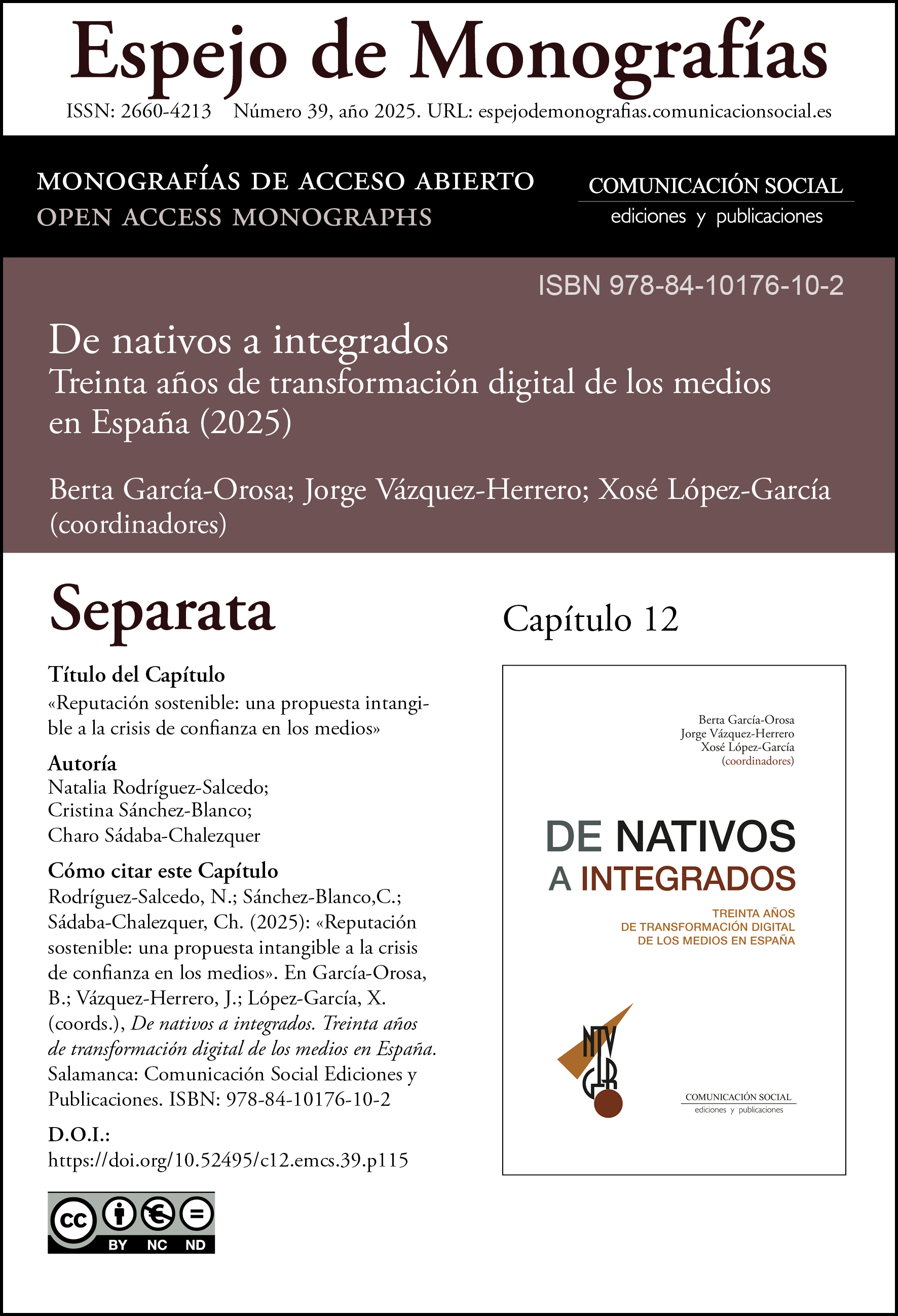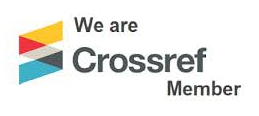Capítulo 12. Reputación sostenible: una propuesta intangible a la crisis de confianza en los medios
DOI:
https://doi.org/10.52495/c12.emcs.39.p115Palabras clave:
confianza, crisis, sostenibilidad, marca periodística, reputación sostenible, España.Resumen
Entre todos los desafíos que enfrenta el periodismo, uno resulta especialmente acuciante: la pérdida de confianza de la ciudadanía en las noticias y en las marcas periodísticas, una tendencia particularmente acentuada en España. La erosión de la confianza no solo perjudica a medios concretos, sino que compromete la credibilidad de la profesión periodística en su conjunto y compromete el cumplimento del derecho a la información al que sirve la prensa. A diferencia de crisis anteriores, esta amenaza afecta un activo intangible pero esencial: la reputación. Este capítulo propone la noción de reputación sostenible como vía para redefinir el propósito, los valores y las prácticas del sector. Esta estrategia implica un compromiso empresarial decidido, así como una transformación editorial que priorice la transparencia, la escucha activa y el vínculo con públicos internos y externos. Reconstruir la legitimidad se presenta clave para afrontar con éxito el incierto escenario actual.
Descargas
Citas
Banerjee, S.; Mont’Alverne, C.; Ross Arguedas, A.; Toff, B.; Fletcher, R.; Nielsen, R.K. (2023): Strategies for building trust in news: What the public say they want across four countries. Reuters Institute for the Study of Journalism. https://reutersinstitute.politics.ox.ac.uk/strategies-building-trust-news-what-public-say-they-want-across-four-countries
Berger, G. (2018). «Is there a future for journalism?», Journalism Practice, vol. 12, núm. 8, pp. 939-953. https://doi.org/10.1080/17512786.2018.1516117
Botsman, R. (2017): Who can you trust? How technology brought us together and why it might drive us apart. New York: Public Affairs Edit., Media Source, Inc.
Castells-Fos, Ll.; Pont-Sorribes, C.; Codina, Ll. (2023): «Decoding news media relevance and engagement through reputation, visibility and audience loyalty: A scoping review», Journalism Practice, pp. 1-20. https://doi.org/10.1080/17512786.2023.2239201
Chan-Olmsted, S.M.; Shay, R. (2015): «Media branding 3.0: from media brands to branded entertainment and information». En Siegert, G.; Foster, K.; Chan-Olmsted, S.M.; Ots, M. (eds), Handbook of Media Branding, pp. 11-32. Cham: Springer. https://doi.org/10.1007/978-3-319-18236-0_2
Cools, H.; Diakopoulos, N. (2024): «Uses of generative AI in the newsroom: Mapping journalists’ perceptions of perils and possibilities», Journalism Practice, pp. 1-19. https://doi.org/10.1080/17512786.2024.2394558
Dahlgren, P. (2018): «Media, knowledge and trust: The deepening epistemic crisis of democracy», Javnost-The Public, vol. 25, núm. 1-2, pp. 20-27. https://doi.org/10.1080/13183222.2018.1418819
Dens, N.; Poels, K. (2023): «The rise, growth, and future of branded content in the digital media landscape», International Journal of Advertising, vol. 42, núm. 1, pp. 141-150. https://doi.org/10.1080/02650487.2022.2157162
Edelman (2021): Edelman Trust Barometer Spain 2021. Disponible en: https://www.edelman.com.es/sites/g/files/aatuss396/files/2021-05/Edelman%20Trust%20Barometer%20Spain%202021_Informe%20Resumen.pdf
Edelman (2022): Edelman Trust Barometer. The Cycle of Distrust. https://www.edelman.com/trust/2022-trust-barometer
Edelman (2023a): Edelman Trust Barometer. Navigating a Polarized World. https://www.edelman.com/trust/2023/trust-barometer
Edelman (2023b): Edelman Trust Barometer. Reporte Latam. https://www.edelman.lat/sites/g/files/aatuss296/files/2023-04/2023%20Edelman%20Trust%20Barometer%20Global%20Report%20Region_LATAM_T%20SPA.pdf
Edelman (2024): Edelman Trust Barometer. Innovation in Peril. https://www.edelman.com/trust/2024/trust-barometer
Eisend, M.; van Reijmersdal, E.A.; Boerman, S.; Tarrahi, F. (2020): «A Meta Analysis of the Effects of Disclosing Sponsored Content», Journal of Advertising, vol. 49, núm. 3, pp. 344-366. https://doi.org/10.1080/00913367.2020.1765909
Fernández-Gubieda, S. (2023a): Sembrando la reputación. Pamplona: EUNSA.
Fernández-Gubieda, S. (2023b): Marco conceptual de la reputación. Implicaciones para el gobierno universitario [Tesis de doctorado no publicada]. Universidad de Navarra.
Ferrer-Conill, R.; Karlsson, M.; Van Couvering, E. (2021): «Native advertising and the negotiation of autonomy, transparency, and deception». En Ferrer-Conill, R.; Karlsson, M.; Van Couvering, E. (eds.), The Routledge Companion to Journalism Ethics. Milton Park: Routledge.
Hardy, J. (2021): Branded content. The fateful merging of media and marketing. London: Routledge.
IAB (Interactive Advertising Bureau) (2019): Native advertising playbook 2.0, May. IAB, New York. Disponible en: http://www.iab.com/guidelines/native-advertising/
Matteo, S.; Dal Zotto, C. (2015): «Native advertising or how to stretch editorial to sponsored content within a transmedia branding era». En Siegert, G. et al. (eds) Handbook of media branding, pp. 169-185. https://doi.org/10.1007/978-3-319-18236-0_12. Cham: Springer.
Mora, J.M. (2020): El valor de la reputación. Pamplona: EUNSA.
Mora, J.M.; Alloza, Á. (2023): Prólogo. In Fernández-Gubieda, Santiago, Sembrando la reputación, pp. 13-17. Pamplona: EUNSA.
Newman, N. (2022): Journalism, media and technology trends and predictions 2023. Oxford: Reuters Institute for the Study of Journalism, Oxford University.
Newman, N. (2024): Periodismo, medios y tecnología: tendencias y predicciones para 2024. Oxford: Reuters Institute for the Study of Journalism, Oxford University. https://reutersinstitute.politics.ox.ac.uk/es/periodismo-medios-y-tecnologia-tendencias-y-predicciones-para-2024#header--4
Núñez-Gómez, P.; Mañas-Viniegra, L.; Hardy, J. (2022): «Branded Content: nuevas formas de comunicación de marca [Editorial]», Revista Mediterránea de Comunicación, vol. 13, núm. 1, pp. 125-126. https://www.doi.org/10.14198/MEDCOM.21499
Palau-Sampio, D. (2021): «Sponsored content in Spanish media: strategies, transparency, and ethical concerns», Digit Journal, vol. 9, núm. 7, pp. 908-928. https://doi.org/10.1080/21670811.2021.1966314
Peifer, J.T.; Meisinger, J. (2021): «The value of explaining the process: How journalistic transparency and perceptions of news media importance can (sometimes) foster message credibility and engagement intentions», Journalism & Mass Communication Quarterly, vol. 98, núm. 3, pp. 828-853. http://dx.doi.org/10.1177/10776990211012953
Pérez-Latre, F.J.; Sádaba-Chalezquer, C.; Bringué, X. (2023): «Journalists in media companies: Proposals for an anthropology of their work», Church, Communication and Culture, vol. 8, núm. 1, pp. 43-58. http://dx.doi.org/10.1080/23753234.2023.2170897
Picard, R.G. (2017): «Funding digital journalism». In Franklin, B.; Elridge, S.A. (eds.), The Routledge Companion to Digital Journalism Studies, pp. 147-154. New York: Routledge.
Sethi, P.S. (1975): «Dimensions of corporate social performance», California Management Review, vol. 17, pp. 58-64. https://doi.org/10.2307/41162149
Usher, N. (2019): «Putting «place» in the center of journalism research: A way forward to understand challenges to trust and knowledge in news», Journalism & Communication Monographs, vol. 21, núm. 2, pp. 84-146. https://doi.org/10.1177/1522637919848362
Vara-Miguel, A. (2022): «Gran éxito de las suscripciones como principal modo de pago por noticias digitales». En Vara-Miguel, A.; Amoedo-Casais, A.; Moreno-Moreno, E.; Negredo, S.; Kaufmann-Argueta, J. (eds.), Digital News Report España 2022, pp. 85-92. Pamplona: Servicio de Publicaciones Universidad de Navarra. https://doi.org/10.15581/019.2022
Vara-Miguel, A.; Sádaba-Chalezquer, C.; Negredo, S.; Sánchez-Blanco, C. (2023): «Revenue diversification strategies of online news organisations: subscriptions and memberships», Profesional de la Información, vol. 32, núm. 2. https://doi.org/10.3145/epi.2023.mar.05
Vara-Miguel, A.; Sánchez-Blanco, C. (2023): «The Impact of Market-Driven Revenues on the Boundaries of Journalism». En Negreira-Rey, M.-C.; Vázquez-Herrero, J.; Sixto-García, J.; López-García, X. (eds.), Blurring Boundaries of Journalism in Digital Media New Actors, Models and Practices, pp. 55-70. Cham: Springer. https://doi.org/10.1007/978-3-031-43926-1_5
Villi, M.; Aharoni, T.; Tenenboim-Weinblatt, K.; Boczkowski, P.J.; Hayashi, K.; Mitchelstein, E.; Tanaka, A.; Kligler-Vilenchik, N. (2022): «Taking a break from news: A five-nation study of news avoidance in the digital era», Digital Journalism, vol. 10, núm. 1, pp. 148-164. https://doi.org/10.1080/21670811.2021.1904266
Wojdynski, B.; Evans, N. (2016): «Going Native: Effects of Disclosure Position and Language on the Recognition and Evaluation of Online Native Advertising», Journal of Advertising, vol. 45, núm. 2, pp.157-168. http://dx.doi.org/10.1080/00913367.2015.1115380
Zomeño, D.; Blay-Arráez, R. (2022): «Nuevos productos y servicios ofertados a las marcas por las principales cabeceras españolas: branded content y publicidad nativa», Revista Mediterránea de Comunicación, vol. 13, núm. 1, pp. 299-316. https://www.doi.org/10.14198/MEDCOM.19798

Publicado
Cómo citar
Número
Sección
Licencia

Esta obra está bajo una licencia internacional Creative Commons Atribución-NoComercial 4.0.
Los artículos publicados en la revista se distribuyen con la Licencia Creative Commons Atribución-NoComercial-SinDerivadas 4.0 Internacional










